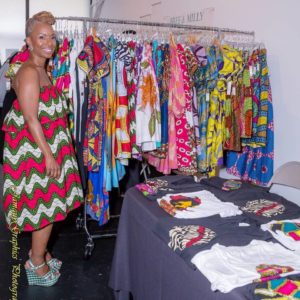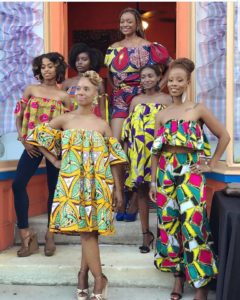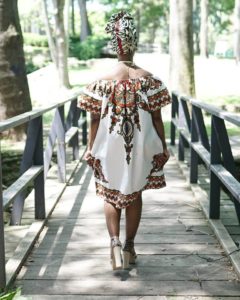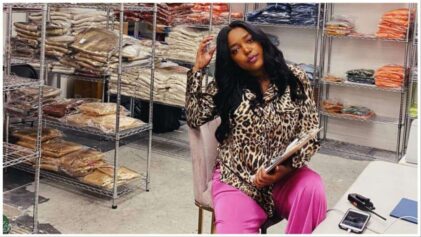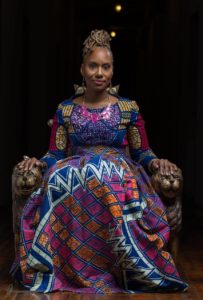
She skips the trendy nude palettes for bright, colorful fabrics that command attention — and people take notice. Anderson designs primarily for women who crave confident colors and loud, African-centered prints. Ankara, a fabric popularized by the West African fashion market, is the recurring theme that weaves her collections together. She sews a majority of her garments to order, creating custom-tailored silhouettes that fit each client like a glove.
“I make things that allow a woman to remember who she is and how beautiful she is,” Anderson said.
Anderson’s memories are vital to her design aesthetic. In 1977, she was far from the master seamstress she would become. She watched intently as her mother hunched over the sewing machine, stitching a dress for her daughter to wear. In the morning when the young girl opened her eyes, there would be a completed dress waiting for her. Anderson was mesmerized by her mother’s resourcefulness and the speed at which she could turn a bundle of fabric into a complete outfit.
That same year, Anderson was enrolled in the 4-H Club in her hometown of Long Island, N.Y. In the 1800s, 4-H was a government-subsidized youth program that functioned as a pipeline to introduce new developments in agriculture research into rural communities through the malleable minds of youth farmers. By the time it reached more urbanized communities like Roosevelt, Long Island, it had developed into a program that fosters youths with vocational and life skills. Given the option to study woodworking, cooking or sewing through the program, the seamstress’s daughter chose sewing. Anderson excelled and continued to sew well into her high school years. After less than three years as a student in the program, she was offered a position as a sewing teacher. The young clothier competed in several New York State fairs with her designs and won during her junior year.
Left: Malacia Anderson vending her dresses at an event
Right: Anderson (bottom left) modeling with her “Lili Girls”
POTENTIAL SEEN
During her senior year, Anderson’s art teacher began taking note of her commitment to sewing and unique design perspective. He encouraged her to apply to the Fashion Institute of Technology at the State University of New York (F.I.T.), which is consistently ranked as one of the top five fashion education institutions in the world. Anderson was confident that her sewing skills would make her stand out in such a competitive environment, but she struggled with sketching. Despite that obstacle, she worked hard to improve her drawing skills and ultimately created a promising portfolio.
“I knew my sewing would overcompensate for my drawing because a lot of designers can draw but they can’t sew,” Anderson said, laughing.
With her technical skills and her teacher’s artistic coaching, Anderson was accepted into F.I.T. As she continued in the program, she noticed that the emphasis on drawing became more pronounced. Still, Anderson’s garments shined, reflecting years of hard work honing her craft. After graduating with an associate’s degree in Fashion Merchandising, the seamstress set her sights on entrepreneurship, enrolling in the business program at Temple University. Despite moving to Philadelphia to continue her education, Anderson continued to sew, mostly creating clothing for herself and her sorors of Zeta Phi Beta Sorority, Inc. While competing in step shows with her chapter sorors, she met a tailor from West Philadelphia who was known for making elaborate costumes for stage performances. Anderson worked under his tutelage until she graduated with a bachelor’s in Business Administration.
LEAP OF FAITH
With degree in hand, Anderson returned to New York to take an administrative job in finance and begin her career as an entrepreneur. She named her business In His Glory Creations and focused on creating custom formal wear for bridal events. Although the money was good, Anderson found the work to be taxing. Sewing began to feel like more of a job than the passion she had loved most of her life. So, she put her sewing machine away to focus on work and regroup.
Years later, Anderson became a customer service representative at Pronovias, a Spanish wedding dress company. While working at Pronovias’ flagship store in Manhattan, Anderson’s co-worker mentioned an online platform for independent creators called Etsy.com. Perusing others’ online shops reignited dreams of entrepreneurship that she had put on hold. She joined sewing groups and watched other seamstresses launch their own brands before her eyes. Anderson thought, “I can sew as good as them, if not better. Why not me?”
A week before her 47th birthday, Anderson opened her store on the platform and named it Lili’s Creations. Inspired by the sartorial essence of the Harlem Renaissance and her love of feminine silhouettes, the seamstress began designing with herself in mind.
“I really just made what I liked,” Anderson said. “I didn’t think about some random woman out there. I like vintage. I’m a girly girl. I like dresses and skirts.”
A month after releasing her inaugural collection, she got her first sale. Anderson began looking at her day job as a means to an end instead of her means of income. During the day, the seamstress would clock hours to save money and at night she’d make dresses to order. She’d pack her beautiful Ankara skirts and dresses in garment bags and travel around New York to vend at events. As she plugged into her customer base, primarily Black women, orders started pouring in. Anderson soon realized she would likely have to leave her full-time job to keep up with her rapidly expanding business.
In January 2016, Anderson achieved her goal of quitting her day job to work for herself full-time. She continues to be successful, operating every aspect of the business solo. She contributes the success of her business to her faith in God, an unwavering commitment to mastering her craft and the privilege of being in a position to take advantage of tech-based entrepreneurship.
“Don’t let the no’s or the slow times be considered a failure. Those are the times you allow God to stretch you,” Anderson said. When asked what advice she would give to aspiring entrepreneurs, Anderson mentions her strong support system — which includes her mother, who often helps out on large orders — and how instrumental it has been to her brand’s success.
“Being an entrepreneur will teach you that you … need a good support system, a mentor,” Anderson said.
You can order clothing from Malacia Anderson at Lili’s Creations on Etsy.
